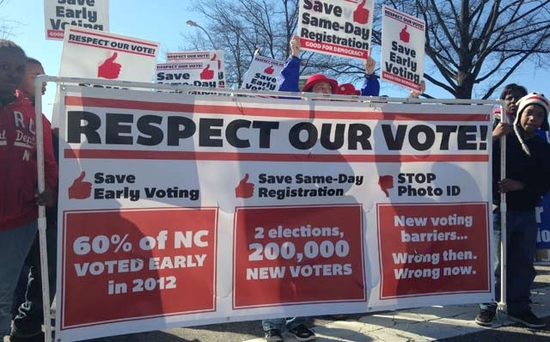
This week in the war on voting is a joint project of Joan McCarter and Meteor Blades
 The U.S. Supreme Court ruled Saturday that Texas can use the voter ID law it originally passed in 2011 in the upcoming election. For the moment, that puts the kibosh on challenges to the law that have ensued ever since. It was a bitter defeat for Obama Department of Justice and other plaintiffs who had argued that the Court should stay the decision of the Fifth Circuit Court of Appeals to enforce the ID law this election cycle. The appeals court had itself on Oct. 14 stayed a 143-page district court decision following a two-week trial saying the ID law discriminates against minorities, the young and the poor who are less likely than older, more affluent white voters to have the mandated forms of ID necessary to cast a ballot.
The U.S. Supreme Court ruled Saturday that Texas can use the voter ID law it originally passed in 2011 in the upcoming election. For the moment, that puts the kibosh on challenges to the law that have ensued ever since. It was a bitter defeat for Obama Department of Justice and other plaintiffs who had argued that the Court should stay the decision of the Fifth Circuit Court of Appeals to enforce the ID law this election cycle. The appeals court had itself on Oct. 14 stayed a 143-page district court decision following a two-week trial saying the ID law discriminates against minorities, the young and the poor who are less likely than older, more affluent white voters to have the mandated forms of ID necessary to cast a ballot.
Early voting begins Monday in Texas.
The High Court’s ruling, the fourth in three weeks affecting major voting law changes, was unsigned, as is usual in such cases. But Associate Justice Ruth Bader Ginsburg wrote a six-page dissent joined by her colleagues Sonia Sotomayor and Elena Kagan.
The law requires that, before voting, citizens must present a driver’s license, passport, military ID or Texas gun license. Student IDs and tribal IDs of American Indians are among the forms Texas will not accept as valid for voting, making the law one of the strictest in the nation. Adam Liptak reports:
Those requirements, Justice Ginsburg wrote, “may prevent more than 600,000 registered Texas voters (about 4.5 percent of all registered voters) from voting for lack of compliant identification.”
“A sharply disproportionate percentage of those voters are African American or Hispanic,” she added, adding that “racial discrimination in elections in Texas is no mere historical artifact.”
Texas officials had argued that there was no evidence that the ID law would disenfranchise so many people, no proof any legislator supporting the law had a discriminatory intent and that the decision of plaintiffs to seek a trial in the lower court so close to the election instead of in 2015 was “opportunistic.” Texas Attorney General Greg Abbott, the Republican gubernatorial candidate who is favored to beat Democrat Wendy Davis, had labeled the lower court ruling “preposterous” and said Judge Nelva Gonzales-Ramos decision had ignored evidence presented by the state.
This isn’t the end of the voter ID case. Neither the Fifth Circuit that stayed the Gonzales’ ruling nor the Supreme Court that backed up that stay have ruled on the law’s constitutionality.
More on the war on voting continues below the orange butterfly ballot.
Voting by mail is convenient, easy, and defeats the best of the GOP’s voter suppression efforts. Sign up here to check eligibility and vote by mail, then get your friends, family, and coworkers to sign up as well.